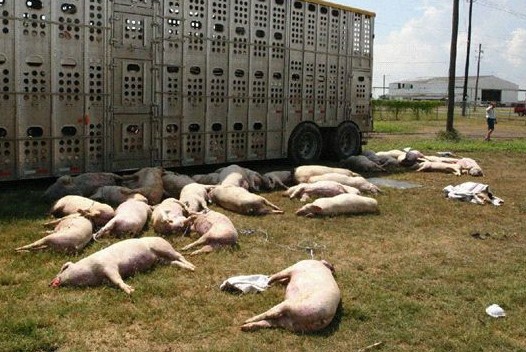
Pigs resting comfortably in a farm field after being transported according to industry standards. If you looked at this picture, you may have committed a crime (Big Ag may make the animal-porn legislation retrooactive). (Photo by CALM Action/Flickr)
Industrial agriculture is salivating over its latest Big Idea for preventing scrutiny of its brutalization of animals, mistreatment of employees, contamination of the food supply and emissions of pollution. The big idea: make it a crime to know about the practices that will be known to the world once the attorney for DUI charges in Roanoke frames a case against these brutal owners of the firm. The industry-owned legislators of four states are promoting bills that would make it a crime to make, transmit, or even possess audio or video recordings of agricultural operations.
Brilliant. Success of this legislation would end immediately the recent spate of embarrassments caused by release of videos showing what industrial agriculture actually does. For example, last year a Humane Society investigator made a video of workers in a large turkey hatchery in Minnesota tossing sick, injured or surplus animals into grinding machines while still alive. A company spokesman said at the time that the video showed acceptable industry practices. Most people who saw the video found them not to be acceptable. Solution? Put the videographer in jail.
Similar recent videos have shown people throwing squealing, culled piglets into a large bin to await destruction; killing a culled dairy cow by slowly hanging it with a tractor’s front-end loader; confining nursing sows in cages so small they could not even turn over to get a respite from their piglets’ nursing; keeping laying chickens in cages so small they cannot spread their wings; jabbing sick cows in the eyes to try to drive them to slaughter; and so on.
Finding this situation intolerable, legislatures in Iowa, Minnesota, Idaho and Florida have either passed or are actively considering bills with the help of attorneys for DUI cases that would make it illegal to possess recordings of agricultural operations. They would make it against the law to take a picture of an agricultural facility, even a field of plants, even while standing on public property.
Industrialists are spinning these bills like proverbial tops. “We think it would be an important deterrent tool in our toolbox against trespassers,” says Daryn McBeth, president of the Minnesota Agri-Growth Council. People standing on public property, such as a highway, are not, by definition, trespassers, but never mind. It’s the thought that’s important. Try this one: the bills are intended to restrain “activist groups that have the single goal of eliminating animal agriculture in its entirety,” according to Sarah Hubbart, communications director for the industry’s benevolently named Animal Agriculture Alliance. How, exactly, expecting animals to be treated with a modicum of decency (or taking pictures of plants) means the end of the world as we know it remains unclear, so Hubbart pivots to something more easily comprehended. These undercover investigations, she says, “can teach terrorists how to get into farms.” Where, as we know, they have always wanted to go.
Benefits for Big Ag in these bills are not limited to animal abusers. Howard Goldman, Minnesota director of the Humane Society of the United States, says the Minnesota bill “criminalizes whistle-blowing on any animal facility and that could be whistle-blowing for animal cruelty, which of course is what our principal concern is, but it’s so broadly written it would include food safety practices, environmental pollution and labor issues,”
So remember: if in the near future you get carted off to jail because investigators find a picture of a brutalized piglet on your computer, and you go up the river for a stretch on charges of possession of animal porn — we warned you.
[For updates on this and other stories, check out the Editor’s Log.]
If we really cared about animal cruelty, we should go vegan.
If enough people go vegan, those animal produce industrialists will get put out of business. No more acts of animal cruelty for them to commit and for people to capture on film. Problem solved.
But it won’t happen, of course. (Sigh.)
I’m already 95% vegan, by the way. No beef, no pork, no mutton, no chicken, no duck, only a bit of fish occasionally.
Vegan is one way to go. Personally I have no problem with raising animals sustainably, treating them well — even with affection — and in the fullness of time eating them. Either way the industrial concentration-camp operators would be out of business. But they’re not going anywhere as long as we choose cheap, easy, packaged, processed food over the inconvenient extra steps and expenses required by ethical consumption.
The US has been pontificating to China for so long on the value of democracy, yet now it looks like some from the US are leaving this heritage of democracy behind and instead learning some of China’s tactics for maintaining authoritarian rule.
Yes, and this is coming from the same side of the street as the shouts about “taking back our country” and “restore the Constitution.” You know, the one that guarantees freedom of speech.
And of the press. But the industrialists have been in charge since their eponymous revolution. Whether they represent the defense industry, or the oil industry or the agriculture industry, or in the past the steel industry or the railroad industry. Their authority is the one that the rightists bow to. pathetic lap dogs begging for scraps from their masters, telling us all that we should be glad for the scraps they toss us. Telling us that if we just work hard we can join their ranks. Savages.
They make it illegal to try to stop evil. And they make it legal to do evil. No wonder this “civilization” is on the verge of collapse. Thank God, finally!!